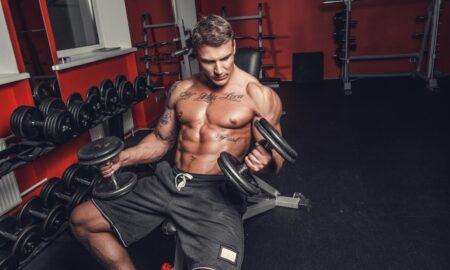Vegetarian activists frequently point out that you can get all the dietary protein you need without eating meat. That’s true. If you eat a variety of fruits, nuts, vegetables and dairy foods in the course of a day, you’ll likely obtain all the amino acids needed for health. From the perspective of building muscle, however, that isn’t the whole story. Some of the health features of a vegetarian diet can have paradoxical effects on bodybuilding progress.
For example, vegetarian fare is generally lowfat, and the lower fat intake may help prevent the onset of the two main killers: cardiovascular disease and cancer. But it’s also true that you need to get at least 20 percent of your total calories from fat to preserve optimal testosterone levels. In addition, vegetarian diets may have less obvious effects on testosterone levels, as illustrated in a recent study.1 Forty-two healthy men, ages 35 to 62, followed two diets for a month, with a two-week interval between the diets. The diets contained the same number of total daily calories but differed in one respect: the protein source. One diet contained 150 grams of lean meat, while the other replaced meat with 290 grams of tofu. To make up for the lower fat content of the soy, the men ate more fat, such as butter and olive oil, which produced an equal calorie count between the two diets.
The authors measured various hormones, such as testosterone, dihydrotestosterone (DHT), estrogen and sex hormone-binding globulin (SHBG), a protein that binds with testosterone and estrogen in the blood. When bound to this blood carrier, testosterone can’t interact with cellular androgen receptors. Only the unbound, or free, forms of testosterone are biologically active.
The results showed that while blood levels of hormones didn’t differ between the two diets, the activity of SHBG was an average of nearly 9 percent greater on the soy diet. Since the extra SHBG tied up circulating testosterone, that led to a relative dominance of estrogen over testosterone. SHBG has a greater binding affinity to testosterone than to estrogen, so any rise in SHBG will tend to affect testosterone more than estrogen levels.
The decreased testosterone levels are thought to help protect against the onset of prostate cancer, which is stimulated by testosterone and DHT, as well as estrogen; however, the lowered-testosterone-level feature of a meatless diet wouldn’t be beneficial for bodybuilding purposes. Even worse is the rise in circulating estrogen. Higher estrogen levels are linked to increased bodyfat, water retention and possibly estrogenic side effects, such as gynecomastia, or ‘bitch tits.’
Another study showed an adverse effect on mental function related to long-term intake of soy products, especially tofu. Considering that the active ingredients in soy, isoflavones, exert estrogenic activity when eaten in large amounts, it’s clearly prudent for bodybuilders to limit their consumption of soy-based products.
1 Habito, R.C., et al. (2000). Effects of replacing meat with soybean in the diet on sex hormone concentrations in healthy adult males. British J Nutr. 84:557-63.




















You must be logged in to post a comment Login